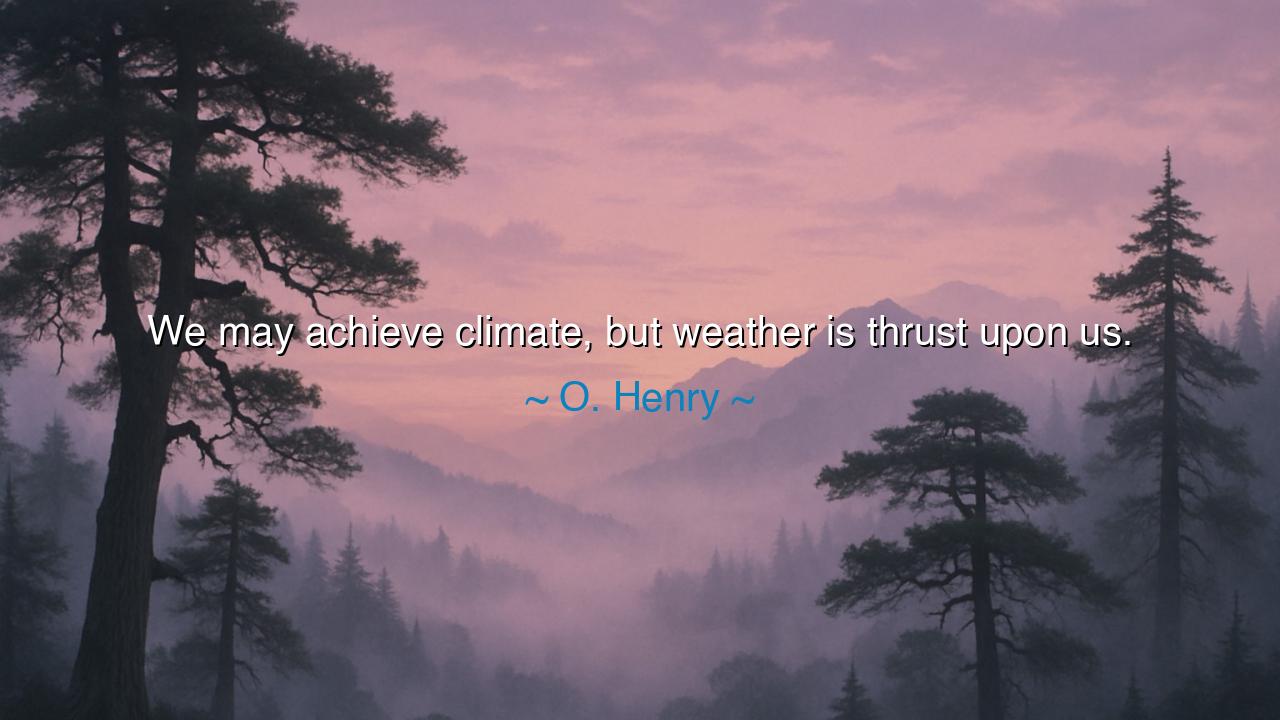
We may achieve climate, but weather is thrust upon us.






When O. Henry wrote, “We may achieve climate, but weather is thrust upon us,” he cloaked profound wisdom in the language of wit. On its surface, the quote speaks of nature — of the steady climate we build over time and the weather that arrives suddenly, beyond our control. But beneath that simplicity lies a deep reflection on life, destiny, and the human condition. The line reminds us that while we may shape the broad direction of our lives through discipline and intention, we cannot command the daily storms that descend upon us. Fate, like weather, arrives uninvited — and our greatness is measured not by what we control, but by how we endure what we cannot.
In the ancient way of seeing, climate represents one’s character — the long, patient work of building virtue, wisdom, and steadiness of heart. Weather, in turn, symbolizes the unpredictable events of the world: fortune and loss, joy and grief, peace and chaos. O. Henry’s insight is that mastery of life lies in distinguishing the two. We can craft the climate of our spirit — by cultivating courage, patience, and integrity — but we must accept that weather will still batter us with rain and wind. The wise do not curse the storm; they adjust their sails.
Consider the story of Odysseus, the wanderer of Homer’s Odyssey. His climate was courage and cunning, his steady character formed through years of trial. Yet his weather — the storms of Poseidon, the temptations of the Sirens, the wrath of gods — was wild and beyond command. Through every tempest, Odysseus could not choose what came, but he could choose who he remained. Thus, his triumph was not in mastering fate, but in mastering himself. In the same spirit, O. Henry reminds us that the world will thrust weather upon us, yet the inner climate we cultivate will decide whether we stand or fall.
O. Henry himself lived this truth. Born William Sydney Porter, he knew both success and ruin. Once a bank clerk, he was imprisoned for embezzlement — a storm that shattered his life’s course. Yet in confinement, he discovered his gift for storytelling. Out of disgrace, he built a new climate of creativity and resilience, writing tales that celebrated irony, redemption, and the unpredictable nature of human fortune. His words, then, were not a clever metaphor, but the distilled wisdom of experience. He had lived both the serene seasons and the sudden storms, and he understood that while we may not command circumstance, we can command response.
This teaching echoes the wisdom of the Stoics. Epictetus once said, “We cannot choose our external circumstances, but we can always choose how we respond to them.” This is the very heart of O. Henry’s truth. The storms of life — betrayal, illness, failure, loss — are the weather thrust upon us. But the serenity of spirit, the consistency of purpose, the strength to rise again — these are the climate we achieve. To build such a climate requires patience, reflection, and a mind anchored in what endures when all else changes.
The ancients would tell us that the gods test those they favor, not to punish them, but to temper them. And so it is with the weather of life. A gentle breeze breeds no sailor; only tempests forge mastery. The human heart, when confronted by hardship, discovers its true measure. The storms that batter us may strip us bare, but they also reveal what is real and lasting. Thus, to live wisely is to accept both climate and weather — to work on the former, and to face the latter with grace.
The lesson, then, is both humbling and empowering. We cannot banish the weather — the sudden turns of fate that shape our days — but we can cultivate our inner climate, one of resilience, gratitude, and peace. Do not lament the storm, but build a soul that can withstand it. Do not seek to predict the winds of fortune, but strengthen the roots of your being so deeply that no gale can tear them out. For though weather is thrust upon us, climate is our creation — the slow, patient art of becoming steadfast in a world that changes like the sky.
And so, let these words be remembered as both comfort and command: Build your climate well. The tempests will come — they always do — but the spirit that has trained itself in endurance, humility, and wonder will stand as the mountain stands: shaped by time, untouched by fear, and magnificent beneath the ever-changing heavens.






AAdministratorAdministrator
Welcome, honored guests. Please leave a comment, we will respond soon